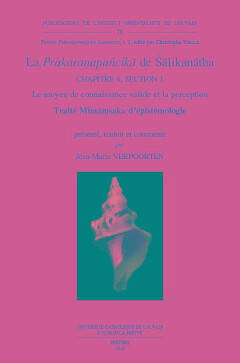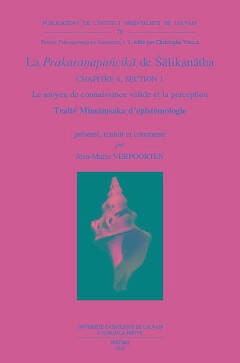
Bedankt voor het vertrouwen het afgelopen jaar! Om jou te bedanken bieden we GRATIS verzending (in België) aan op alles gedurende de hele maand januari.
- Afhalen na 1 uur in een winkel met voorraad
- In januari gratis thuislevering in België
- Ruim aanbod met 7 miljoen producten
Bedankt voor het vertrouwen het afgelopen jaar! Om jou te bedanken bieden we GRATIS verzending (in België) aan op alles gedurende de hele maand januari.
- Afhalen na 1 uur in een winkel met voorraad
- In januari gratis thuislevering in België
- Ruim aanbod met 7 miljoen producten
Zoeken
La Prakaranapancika de Salikanatha, Chapitre 6, Section 1: Le moyen de connaissance valide et la perception
Traité Mimamsaka d'épistémologie
J.-M. Verpoorten
€ 89,00
+ 178 punten
Omschrijving
English summary: This book contains the French translation and explanation of the text of the first section (pariccheda) of the sixth chapter (prakarana) of the Prakaranapancika of Salikanatha. This thinker (late 8th-early 9th century AD) is a representative of the orthodox Brahmanic philosophical school named Mimamsa, considered primarily as an exegesis of duty relating to the Vedic ritual order. However, from the 6th-7th centuries, during the ideological offensive of Brahmanism against Buddhism, alongside the so-called second investigation (Uttara-M.) of the Sankarian Vedanta on the question of Brahman and [self]incarnation, the first Mimamsa (Purva-M.), through the voices of two of its doctors, Prabhakara and Kumarila, developed its own epistemology and metaphysics, which in general refute Buddhist positions, even if on occasion it adopts some of them. Salikanatha, a disciple of Prabhakara, participates in this enterprise. Prakaranapancika is a kind of doctrinal encyclopaedia of the school of thought that puts forward the point of view of the Prabhakaran Mimamsa on many contemporary philosophical questions. Chapter Six begins by developing a definition acceptable to the Mimamsa of the valid means of knowledge (pramana) by criticizing other definitions, notably Buddhist. The same pattern is repeated for the examination of the first and most important pramana perception (pratyaksa). Throughout his presentation, the author deals with valid knowledge, erroneous or doubtful knowledge, memory and yogic intuition, the various contacts that make vision possible, conceptual or non-conceptual elements of knowledge, the existence or not of forms for knowledge, self-awareness, etc. On these various problems, Salikanatha sometimes adheres to the views of his school and sometimes leans towards the Buddhist side, and singularly towards Dharmakirti. French description: Cet ouvrage est la traduction francaise et l'explication du texte de la premiere section (pariccheda) du sixieme chapitre (prakarana) de la Prakaranapancika de Salikanatha. Ce penseur (fin 8e - debut 9e s. de n.e.) est un representant de l'ecole philosophique brahmanique orthodoxe nommee Mimamsa, investigation consideree d'abord comme une exegese du devoir relatif a l'ordre (dharma) rituel (karman) vedique. Toutefois, a partir des 6e-7e siecles, lors de l'offensive ideologique du brahmanisme contre le bouddhisme, a cote de l'investigation dite seconde (Uttara-M.) du Vedanta sankarien portant, elle, sur la question du brahman et du [soi] incarne (sariraka), la Mimamsa premiere (Purva-M.), par la voix de deux de ses docteurs, Prabhakara et Kumarila, a developpe une epistemologie et une metaphysique propres, qui, en general, refutent les positions bouddhiques, meme si, a l'occasion, elle en adopte certaines. C'est a cette entreprise que participe Salikanatha, disciple de Prabhakara. La Prakaranapancika est une sorte d'encyclopedie doctrinale de l'ecole qui tente de donner le point de vue de la Mimamsa de tendance Prabhakara sur de nombreuses questions philosophiques debattues a l'epoque. Le chapitre 6 commence par elaborer une definition acceptable par la Mimamsa du moyen de connaissance valide (pramana) en critiquant d'autres definitions, notamment bouddhistes. Le meme schema se repete pour l'examen du premier et plus important des pramana's: la perception sensible (pratyaksa). Tout au long de son expose, l'auteur traite de la connaissance valide, de celle erronee ou douteuse (sur base d'exemples-types concrets, comme celui de la confusion nacre-argent), du souvenir et de l'intuition yogique; des contacts divers qui rendent possibles la vision, des elements conceptuels ou non conceptuels de la connaissance, de l'existence ou non de formes pour celle-ci; de la conscience de soi; etc. Sur ces divers problemes, Salikanatha tantot adhere aux vues de son ecole, par exemple a la conviction realiste que le monde extra-mental existe, tantot penche du cote bouddhiste, et singulierement de Dharmakirti, comme dans le cas de la conscience auto-lumineuse, ou il s'oppose a son collegue Mimamsaka Kumarila.
Specificaties
Betrokkenen
- Auteur(s):
- Uitgeverij:
Inhoud
- Aantal bladzijden:
- 215
- Taal:
- Frans
- Reeks:
- Reeksnummer:
- nr. 70
Eigenschappen
- Productcode (EAN):
- 9789042934979
- Verschijningsdatum:
- 16/03/2018
- Uitvoering:
- Paperback
- Formaat:
- Trade paperback (VS)
- Gewicht:
- 576 g

Alleen bij Standaard Boekhandel
+ 178 punten op je klantenkaart van Standaard Boekhandel
Beoordelingen
We publiceren alleen reviews die voldoen aan de voorwaarden voor reviews. Bekijk onze voorwaarden voor reviews.









